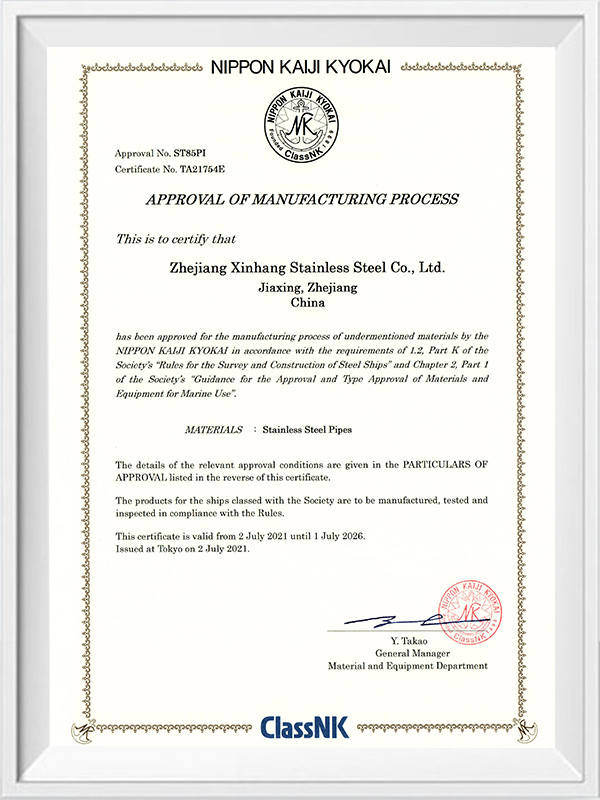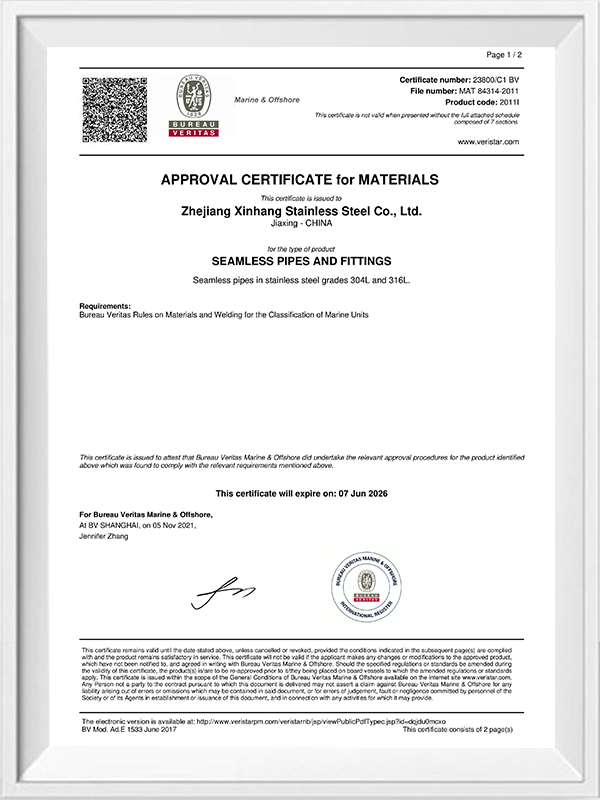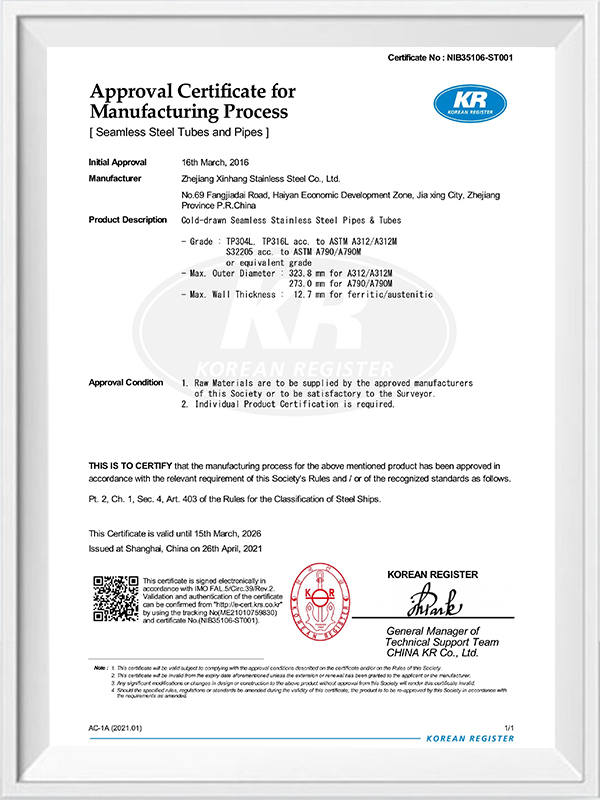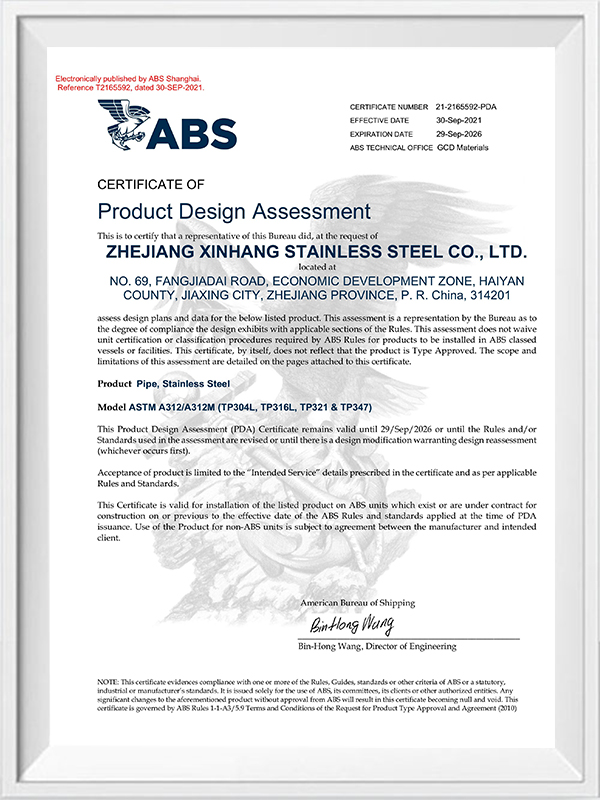

Xinhang Special Material Co., Ltd. Hangzhou Branch is China Stainless Steel chemical equipment pipe Suppliers and Stainless Steel chemical equipment pipe Factory, founded in 2007 and moved to Longyou Economic Development Zone, Zhejiang Province, in 2022. It covers an area of 130,000 square meters, more than 30 production lines, 300 workers, 20 R&D people, 30 inspection people and an annual output of 50,000 tons.
It has passed ISO9001:2008 quality management system, PED 97/23/EC EU Pressure Equipment Directive certification, China Special Equipment Manufacturing License (Pressure Tube) TS certification, ASME certification, provincial enterprise standardization management system, ISO14000:2004 environment management system, cleaner production (green enterprise), and a series of certifications, as well as China Classification Society (CCS), American Bureau of Shipping (ABS), British Register of Shipping (LR), Deutsche Veritas (GL), Bureau Veritas Society (BV), Det Norske Veritas (DNV), and Korean Register of Shipping (KR) factory certification.
The main products include stainless steel pipes, pipe fittings, flanges, valves, etc., which are widely used in petroleum, chemical industry, nuclear industry, smelting, shipbuilding, pharmaceuticals, food, water conservancy, electric power, new energy, mechanical equipment, and other fields. The company adheres to the corporate tenet of "quality for survival, reputation for development" and wholeheartedly serves every customer to create a win-win situation.




Bottom line: how to weld stainless steel pipe without sugar and leaks For most stainless steel pipe work, the most reli...
View MoreDirect answer: what a “stainless steel pipe pressure rating” really means A stainless steel pipe does not have one univ...
View MoreIn our shop, bending stainless steel pipe is one of those operations that looks simple but punishes shortcuts. Stainless...
View MoreWhat SCH 10 stainless steel pipe specifies (and what it doesn’t) In piping specifications, “SCH” (schedule) is shorthan...
View MoreWhat are the key factors to consider when designing stainless steel chemical equipment pipes?
Chemical Compatibility: Selecting the appropriate stainless steel grade based on its resistance to corrosion from the chemicals it will come into contact with is crucial. Consider factors like the concentration, temperature, and pH of the chemicals.
Pressure and Temperature: Determine the operating pressure and temperature conditions the pipes will be subjected to. Choose a stainless steel grade that can withstand these conditions without deformation or failure.
Pipe Size and Thickness: Calculate the required pipe size and thickness based on the flow rate, pressure drop, and fluid properties. Ensure the selected dimensions can handle the intended flow without excessive pressure loss or structural weakness.
Material Finish: Consider the surface finish of the stainless steel chemical equipment pipes, as smoother finishes can reduce the risk of corrosion and facilitate easier cleaning, which is important in chemical applications to prevent contamination.
Joining Methods: Select appropriate joining methods such as welding, flanging, or threading based on the application requirements, operating conditions, and compatibility with the chosen stainless steel grade.
Accessibility for Maintenance: Design the layout of the pipes to allow easy access for inspection, cleaning, and maintenance. Consider factors like accessibility to valves, fittings, and potential areas prone to corrosion or buildup.
Vibration and Thermal Expansion: Account for factors like vibration and thermal expansion to prevent damage to the pipes and associated equipment. Incorporate expansion joints or flexible connections where necessary to accommodate thermal fluctuations and prevent stress-induced failure.
Compliance with Standards and Regulations: Ensure the design complies with relevant industry standards, codes, and regulations governing the construction and use of chemical equipment pipes. This includes considerations for safety, material specifications, and environmental regulations.
How does the temperature and pressure affect the selection and performance of stainless steel chemical equipment pipes?
Material Selection: Different grades of stainless steel exhibit varying resistance to corrosion, mechanical strength, and temperature tolerance. Higher temperatures and pressures may necessitate the use of specialized stainless steel alloys with enhanced heat resistance and mechanical properties. For example, austenitic stainless steels like 304 and 316 are commonly used at moderate temperatures, while duplex or super duplex stainless steels are preferred for high-temperature and high-pressure applications.
Corrosion Resistance: Elevated temperatures and pressures can accelerate corrosion rates, particularly in aggressive chemical environments. Therefore, the selected stainless steel grade must offer adequate corrosion resistance under the anticipated operating conditions. Factors such as the presence of chlorides, acids, and other corrosive agents must be considered when evaluating corrosion resistance requirements.
Mechanical Strength: Increased temperature and pressure can impose higher mechanical stresses on the pipes, which may lead to deformation, buckling, or rupture if the material's mechanical strength is insufficient. The selected stainless steel grade should possess the necessary tensile strength, yield strength, and ductility to withstand these mechanical loads without failure.
Thermal Expansion: Temperature variations cause thermal expansion and contraction of the pipes, which can induce stress and strain within the material. Stainless steel grades with low thermal expansion coefficients help minimize the risk of thermal stress-induced damage, particularly in systems subjected to rapid temperature changes.
Creep Resistance: At elevated temperatures, stainless steel pipes may experience creep deformation, which is the gradual deformation under constant load over time. Alloys with high creep resistance, such as austenitic stainless steels stabilized with niobium or titanium, are preferred for applications involving sustained high temperatures and pressures.
Pressure Containment: The design and construction of stainless steel chemical equipment pipes must ensure adequate pressure containment to prevent leaks, bursts, or other catastrophic failures. This involves selecting the appropriate wall thickness, reinforcement, and joining methods to withstand the internal pressure exerted by the fluid.
Temperature Cycling: Thermal cycling, caused by fluctuations in operating temperatures, can affect the structural integrity and fatigue resistance of stainless steel pipes. Proper material selection, design considerations, and thermal insulation help mitigate the effects of temperature cycling and prolong the service life of the piping system.
We'll never share your email address and you
can opt out at any time, we promise.